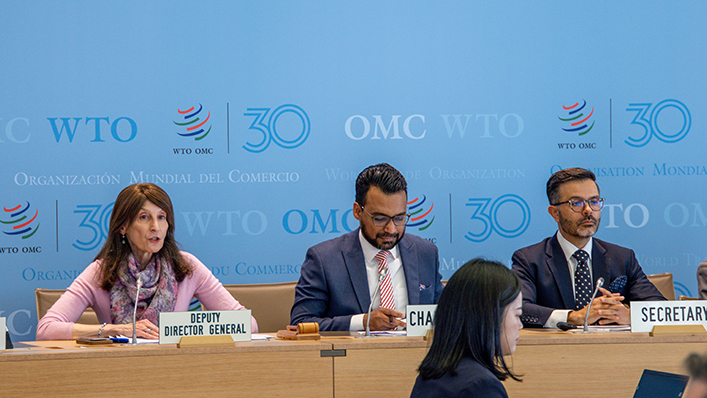
In her opening remarks to the anniversary event, Deputy Director-General Angela Ellard noted that the CRO, which first met exactly 30 years ago, was founded upon a clear vision: fostering international cooperation and facilitating trade through predictable, clear and harmonized rules of origin.
DDG Ellard noted that the Committee’s initial work was focused on negotiating harmonized rules of origin for all non-preferential purposes, i.e., for rules applicable to trade outside of regional and preferential trade agreements. While completion of the ambitious harmonization objective has proven unattainable, “the objectives of the Agreement retain all their significance for members and business in today’s world,” she said.
“Businesses navigating global trade need predictability and welcome greater simplicity and transparency,” DDG Ellard told the audience. “Transparency should, therefore, remain a central objective of this Committee, and I am glad to see recent work in this area, as well as the voluntary use of a new notification template.”
“New technologies, digital trade procedures, blockchain technologies, and artificial intelligence open many new opportunities and challenges that could guide the work of this Committee,” she continued. “In fact, in the past few years, we have seen an expansion of the Committee’s work, particularly on preferential rules of origin for least developed countries. There is great scope for members to learn from each other and to improve their practices with a view to facilitating trade.”
“As members implement more detailed and complex rules of origin and control mechanisms, they must also strive for rules that facilitate trade,” she added. “In this context, multilateral discussions within this Committee are increasingly relevant.
Rules of origin are the criteria used to define where a product is made for customs purposes. They are also important for implementing other trade policy measures, including trade preferences, quotas, marking, anti-dumping measures and countervailing duties.
Non-preferential rules of origin are those which apply when trade is conducted on a most-favoured nation (MFN) basis. Preferential rules of origin are those which apply in reciprocal trade preferences (i.e. regional trade agreements or customs unions) or in non-reciprocal preferences (i.e. preferences in favour of developing countries or LDCs).
The Chair of the CRO, Mr. Guna Seelan Balakrishnan of Malaysia, said predictable and clear rules of origin are important for global trade.
“The necessity of our work is shown in the simplicity of our purpose to determine where a good is made,” the Chair said. “So simple, but as the past 30 years have shown, so complex at the same time.”
Mr Balakrishnan welcomed in particular the CRO’s recent work on preferential rules of origin for least developed country members, a period of “some of the most extensive activity” from the Committee. “The responses and interactions I have been part of during the consultations with the LDC Group and the preference granting members has reflected this adaptability to work through an important part of the Committee’s mandate,” he said.
While outlining the history of the negotiations that led to the conclusion of the Agreement and the subsequent work of the CRO, Darlan F. Martí from the WTO Secretariat also paid tribute to trade negotiators, customs officials, international organizations and former Chairs who dedicated many hours of work to the CRO.
He also emphasized that the current work of the Committee could be useful for all members: “The lessons learned from this work extend beyond the LDCs – for instance, our conversations about utilization rates or trade facilitating practices that are conducive to the utilization of preferences,” he said. “This is something that is not only useful in the context of non-reciprocal trade preferences for the LDCs, but it’s something that, if members want, could go beyond this and also be discussed in the context of preferential rules of origin used in (free trade agreements) as well.”
To conclude the event, the International Trade Centre gave an overview of statistics on the use of the WTO, WCO, ITC “Origin Facilitator“, a publicly-available global database on rules of origin.
Several members and observers took the floor to thank the speakers for their presentations, to comment on the work of the Committee and to identify priorities for future work. They also extended their appreciation to the Chair of the Committee, Mr. Balakrishnan.
DDG Ellard’s statement and the presentations made, including a video recording of the session, will be made available in the events section of the Rules of Origin portal of the WTO website.
CRO meeting
At its meeting on 3 April, the CRO continued to review developments related to preferential rules of origin for LDCs. Japan provided additional information on its consignment obligations. The EU presented the functioning of its self-certification scheme as well as the operation of the “non-manipulation” principle. China updated the Committee on the introduction of electronic certification for LDCs. The United Kingdom reported on the rates utilization of its Developing Countries Trading Scheme.
Cambodia presented a new paper regarding differentiating utilization rates of preferential trade arrangements for LDCs while the LDC Group presented ongoing research concerning the identification of specific cases of firms using cumulation in Africa. Cumulation refers to provisions allowing producers in one country to source parts and inputs from other countries without losing the originating status of that input.
The Secretariat provided an overview of notifications received on non-preferential rules of origin requirements. Switzerland and Viet Nam were the first members to update their notifications using the new template proposed by the Chair in November 2024. The Secretariat noted that 57 members apply non-preferential origin requirements, 61 members do not, and 21 members have not submitted any information yet.
Next meeting
The next formal CRO meeting will take place on 5-6 November.
Share
Reach us to explore global export and import deals